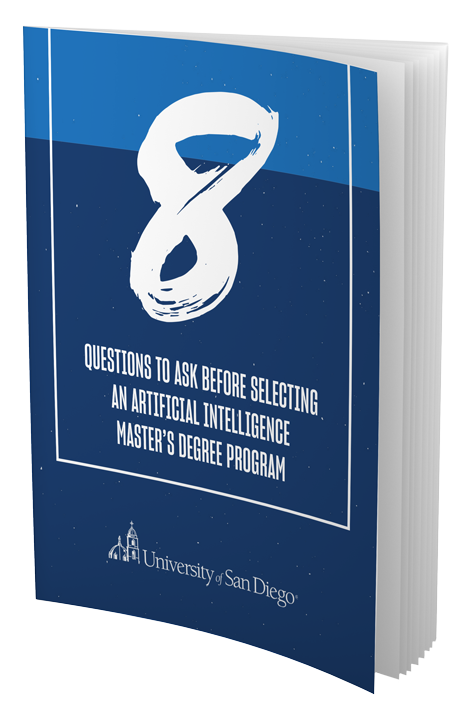Artificial intelligence (AI) and machine learning (ML) are at the forefront of a transformative era within the pharmaceutical industry, often referred to as Pharma 4.0. This shift extends beyond technological upgrades, marking a comprehensive transformation in drug development and manufacturing processes. Characterized by digital interconnectedness and innovative practices, Pharma 4.0 is setting new standards in the industry.
Rooted in the principles of Industry 4.0, which revolutionized manufacturing through digitalization, Pharma 4.0 represents the pharmaceutical sector’s adaptation to this digital wave. It signifies a strategic and operational shift, emphasizing the role of advanced technologies in shaping the future of pharmaceuticals.
For professionals in the pharmaceutical field and students in advanced AI programs, such as the USD Master of Science in Applied Artificial Intelligence, grasping the nuances of Pharma 4.0 is crucial for adapting and excelling in an environment where digital innovation is the key to advancing healthcare solutions.
What Is Industry 4.0?
To understand Pharma 4.0, it’s essential to start with its predecessor. Industry 4.0 is the significant digitization phase in manufacturing characterized by increased data usage, connectivity, analytics, human-machine collaboration and robotics advancements. More than simple technological upgrades, this shift is changing business models and operational processes to redefine the core of industrial work across various sectors.
Industry 4.0 is crucial because it sets the stage for more resilient and adaptable operations. According to a McKinsey survey, 93% of manufacturing and supply-chain professionals are focusing on resilience, with 90% investing in digitization talent. This emphasis on digital capabilities highlights the importance of Industry 4.0 in preparing for future challenges and maintaining competitive advantage.
What Is Pharma 4.0?
The principles of Industry 4.0 have been pivotal in shaping the pharmaceutical sector’s evolution into Pharma 4.0. The International Society for Pharmaceutical Engineers (ISPE) defines Pharma 4.0 as the convergence of people, systems and data within a unified network with the goal of enhanced productivity, efficiency and quality.
This progression, as noted by the National Institutes of Health (NIH), has simplified the manufacture of complex drugs and brought about greater process flexibility thanks to technologies such as AI, robotics and the Internet of Things (IoT).
These technologies bridge knowledge and information gaps, offering life science professionals insights on demand. Pharma 4.0’s connected systems improve predictions, automate processes and optimize the drug development and manufacturing workflow.
The benefits are tangible. The application of AI and machine learning in Pharma 4.0 has the potential to lead to several significant improvements in the pharmaceutical industry, including:
- Reductions in deviations and closures by up to 80%
- Increases in laboratory productivity by up to 60%
- Over 40% improvement in Overall Equipment Effectiveness (OEE) on packaging lines
- More than 30% reduction in changeover times
In the evolving Pharma 4.0 landscape, AI professionals and students find a field rife with opportunities. As the industry grows, so does the demand for skills in AI, ML and digital strategy, underscoring the value of focused education in these areas.
Five AI Applications in Pharma 4.0
Artificial intelligence is a key driver in the advancements of Pharma 4.0, revolutionizing various aspects of the pharmaceutical industry from research to production and quality control.
- Evaluating Large Data Sets
AI excels in analyzing extensive data sets, a critical component in drug discovery. It processes complex biological information to forecast interactions between compounds, accelerating the identification of potential drug candidates.
- Enhancing Drug Manufacturing
In drug manufacturing, AI improves efficiency and accuracy. It optimizes production processes, reduces waste and maintains precision. For instance, predictive maintenance algorithms anticipate equipment failures, minimizing downtime and ensuring uninterrupted production.
- Quality Control Testing
Machine learning algorithms significantly contribute to quality control. They analyze past production data to predict and prevent deviations, ensuring consistent product quality.
- Demand Forecasting with Predictive Analytics
AI aids in forecasting drug demand through predictive analytics, essential for efficient supply-chain management. It predicts the necessary product quantity, helping to avoid shortages or excess stock.
- Reducing Drug Development Time
AI accelerates the drug development process by automating tasks like data entry and analysis, decreasing the time for a drug to reach the market. For example, it quickly evaluates clinical trial data, identifying trends and results faster than traditional methods.
As the NIH highlights, the use of AI in the pharmaceutical sector is extensive and continues to expand. It brings efficiency and improved outcomes in drug formulations and plays a vital role in the research and development of critical medications. AI’s influence extends across radiology, radiotherapy and clinical trials, impacting patient satisfaction and drug adherence monitoring.
Implementing Pharma 4.0
The first step in implementing Pharma 4.0 is assessing the organization’s digital maturity. Key metrics include digital technology integration, data utilization, workforce digital skills and digital strategy alignment. Frameworks like the World Economic Forum’s Digital Maturity Model and the Deloitte model for the pharmaceutical sector, guide this assessment. Internal and external audits are crucial for identifying strengths and areas for improvement, setting the stage for digital advancement.
Evaluating Technology Needs
Evaluating technology needs involves using tools like SWOT analysis, gap analysis and tech audits. These help in understanding the technological requirements for Pharma 4.0. Expert consultations, especially with external AI and Pharma 4.0 specialists, provide unbiased insights into the technology landscape. Staying updated with market research ensures alignment with the latest Pharma 4.0 innovations.
Creating a Digital Transformation Roadmap
Creating a digital transformation roadmap involves navigating challenges such as unclear vision, resistance to change and resource limitations. Solutions include securing stakeholder buy-in, offering comprehensive training and consulting experts. Adequate budgeting is also essential. Flexibility in the roadmap is key to adapting to unforeseen changes, ensuring a dynamic and responsive approach to digital transformation.
A strategic, well-planned approach to implementing Pharma 4.0, informed by a thorough assessment of digital maturity and technology needs, paves the way for a successful digital transformation.For comprehensive information on Pharma 4.0 implementation, ISPE.org offers extensive resources.
Best Practices for Pharma 4.0 Implementation
Implementing Pharma 4.0 requires a strategic approach, incorporating several best practices, including:
- Strong Leadership Support: Leadership must actively support the Pharma 4.0 initiative, providing clear direction and resources.
- Clear and Concise Vision: A well-defined vision guides the Pharma 4.0 strategy, ensuring everyone understands the goals and outcomes.
- Workforce Training and Upskilling: Continuous education and training are crucial for equipping the workforce with the necessary AI and digital technology skills.
- Stakeholder Engagement: Involving all stakeholders ensures alignment and addresses concerns throughout the transformation process.
- A Phased Approach: Implementing Pharma 4.0 in stages allows for manageable progression and easier adaptation.
- Data Governance and Management: Effective data governance is essential to prevent data quality issues (“garbage in, garbage out”).
- Incorporation of AI and ML: Integrating AI and ML into processes enhances efficiency and innovation.
- Cybersecurity Measures: Protecting digital assets and data is crucial in the increasingly connected Pharma 4.0 environment.
- Continuous Monitoring and Adaptation: Ongoing evaluation and flexibility allow for adjustments in response to new challenges and opportunities.
- Partnerships with Tech Providers: Collaborating with technology experts brings in specialized knowledge and advanced solutions.
- Project Management and Documentation: Effective planning and documentation ensure business continuity and cost management.
- Regulatory Compliance and Risk Management: Ensuring compliance with regulations and ethical standards, including bias mitigation, transparency, and the ethical use of AI and automation, is essential for maintaining trust and legal integrity.
Several hurdles can arise during Pharma 4.0 implementation. Here’s how to overcome them:
- Investment in Advanced Technology: Significant investment is often required for new technologies, demanding careful financial planning.
- Organizational Structural Changes: Adapting to Pharma 4.0 may require restructuring, which can be challenging for established companies.
- Intellectual Property Protection: Safeguarding innovations and proprietary information is critical in a digital environment.
- Technical Glitches and Employee Resistance: Technical issues and employee skepticism can hinder progress. Regular training, clear communication and addressing concerns are vital for overcoming these obstacles.
- Non-Technical Staff Concerns: Addressing biases and misunderstandings about AI among non-technical staff is crucial. Providing basic education and training on AI usage can foster trust and effective collaboration.
Navigating the Future with Pharma 4.0
The emergence of Pharma 4.0 signifies a transformative era in the pharmaceutical industry. This integration delivers enhanced efficiency, innovation and a new paradigm in drug development and manufacturing. As Pharma 4.0 aligns with broader digital trends, new opportunities abound for professionals equipped with AI knowledge and skills.
For those aspiring to be at the forefront of Pharma 4.0, programs such as the University of San Diego’s Master of Science in Applied Artificial Intelligence equip professionals with the skills and knowledge needed to navigate and lead in this new era.
To find out how to prepare for a career in this exciting field, download our eBook, 8 Questions to Ask Before Selecting an Applied Artificial Intelligence Master’s Program.




